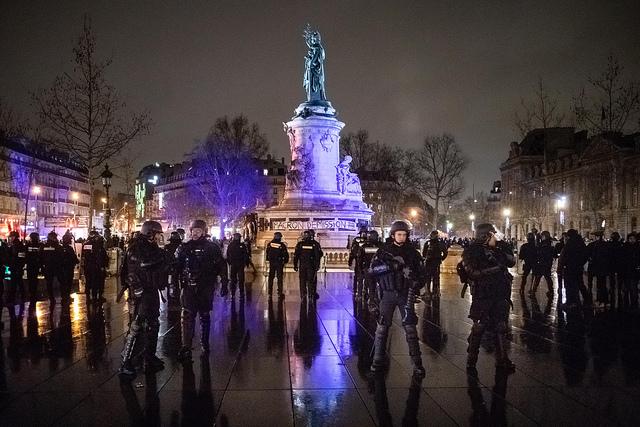
The beat
Encryption laws already yielding results
The Australian Federal Police says that criminal suspects are already feeling the effects of new encryption laws, despite continuing controversy over their implementation. Under the new laws, people who are under investigation must unlock their digital devices after a warrant is issued or face of maximum of five or 10 years in prison, depending on the offence.
Surveillance protest arrest
Police in London have trialled new facial recognition technology that scans everyone passing by for matches to criminal watchlists. During the trial, a number of arrests were made and a man was fined for making obscene remarks to police after being asked to stop covering his face and show identification. Civil liberties groups have serious concerns about the use of this equipment, but police contend that they struggle to keep up with crime because of their outdated technology.
French court rules on use of rubber bullets against protestors
As the ‘yellow vests’ protests continue, France’s highest court has upheld the use of ‘golf-ball-sized’ rubber bullets by riot police and found that it doesn’t qualify as a serious violation of the right to protest. The use of these bullets has angered protestors. While the court acknowledged that the rubber missiles could cause grievous injuries, it found their continued use to be necessary in the face of frequent violence and destruction during the protests.
Checkpoint
Costs of the Venezuelan crisis
Human traffickers are funding the escape of Venezuelan women only to then force them into prostitution in Spain to pay back their travel costs. The Spanish interior ministry recorded a 1,200% increase in episodes of forced sexual abuse of women from Venezuela between 2014 and 2017. Spanish authorities estimate that 208,333 Venezuelans have fled to Spain in the wake of Venezuela’s economic and political meltdown.
Turkey decries ‘European Union solidarity’
The Turkish foreign ministry has criticised a joint declaration by the Fifth Summit of the Southern European Countries in Nicosia, claiming that the document attacks Northern Cyprus and Turkey in the name of ‘European Union solidarity’. The declaration urges Turkey to normalise its relations with the Republic of Cyprus and to allow Cypriot access to Turkish ports, airports and airspace. Turkey has responded by saying that the declaration doesn’t provide sufficient recognition of the legitimate rights of the Turkish Cypriot community.
Border barrier in Gaza
Israel has started building a six-metre-high barrier along its border with the Gaza Strip. Planned to be completed by the end of 2019, the border fence will join a 65-kilometre underground barrier currently under construction, as well as a fortified breakwater in the Mediterranean Sea. These structures are intended to prevent Hamas from entering Israel by land, by underground tunnels and by sea.
CT scan
Fears of pre-election terrorist attacks in Nigeria
As the territory held by the Islamic State terror group shrinks in Iraq and Syria, the Islamic State West Africa Province (ISWAP) has strengthened dramatically in recent months around the Lake Chad region. While the jihadist group Boko Haram, which has terrorised parts of northeastern Nigeria, Chad, Niger and northern Cameroon, has been weakened but not eliminated, ISWAP targets security forces and NGOs. There are reports that the IS-backed group is plotting nationwide attacks in Nigeria in the lead-up to the presidential election. Despite the growing threat, the US is reportedly planning to wind down its counterterrorism efforts in West Africa.
Tensions high in Kenya
Residents in the central Kenyan town of Nanyuki were evacuated after 152 bombs were found at a hardware shop last weekend. Explosives specialists eventually found that the bombs were dummies. The British Army had used them for training and then left them as scrap metal. The country is still unsurprisingly on edge after 21 people were killed in January at a luxury hotel by terrorist group al-Shabaab in Nairobi. The Kenyan government fears that terrorism will spoil its hopes for increased tourism and international investment.
Repatriation of Islamic State fighters
The French government is considering repatriating Islamic State fighters currently detained by the Kurdish-led Syrian Democratic Forces. This policy change follows President Donald Trump’s announcement that US troops will be withdrawn from Syria, with fears that this will make it easier for dangerous individuals to escape and disperse. However, repatriation of the fighters brings its own problems. French prisons have, for example, acted as ‘laboratories of radicalisation’ in recent years. This 2017 report examines the issue of foreign fighters who have gone to Syria or Iraq and the problem of returnees.
First responder
Polish beef scandal
Europe is facing another beef scandal after it was revealed that an abattoir in Poland may have sold tainted meat from sick cows. Evidence of the abattoir’s activities was filmed by an undercover journalist who released the footage online. In response, Poland triggered the EU’s Rapid Alert System for Food and Feed. EU investigators are looking into the case, but Poland’s minister for agriculture said he’s confident that no tainted meat reached supermarket shelves.
Measles still spreading
The number of measles cases is growing around the world, including in the United States where the disease continues to spread. US health officials announced in 2002 that the highly contagious disease had been eliminated, but the number of ‘imported’ cases is now growing once again. The resurgence of measles has renewed calls from the World Health Organization for nations to invest in immunisation systems and sustained vaccination programs. But a lack of public trust has undermined efforts to stem the spread of the disease.
Portent of disaster in Japan?
Sightings of rarely seen oarfish have raised fears of an impending natural disaster in Japan. The oarfish is a rare species of fish that lives at depths of between 200 and 1,000 metres. Japanese often refer to the fish as ‘ryugu no tsukai’ or ‘messenger of the seas’, believing its appearance presages a major earthquake or tsunami.